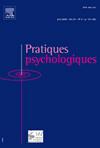Self-perception and adjustment to Crohn's disease in emerging and young adults: The clinical and psychosocial associated factors
IF 0.3
4区 心理学
Q4 PSYCHOLOGY
引用次数: 0
Abstract
Objectives
Crohn's disease is often declared in early adulthood, between 15 and 30 years old, a period marked by important psychosocial transitions. Yet, the diagnosis’ impact during this sensitive developmental period remains little explored. The aim was to assess whether self-perception and adjustment to illness differ depending on age (emerging adults versus young adults) and time since diagnosis (< 2 years vs > 2 years), and explore associations between self-perception, clinical and psychosocial variables.
Method
In this cross-sectional study, participants were emerging adults (18–25 years old) and young adults (26–35 years old) with Crohn's disease, recruited via an association and communities of patients online. They answered an online survey assessing their disease activity, illness perception, coping strategies, social support and self-perception.
Results
Fifty-two participants (18–35 years old) were included. Mann-Whitney's U test showed that compared to those diagnosed for over two years, those recently diagnosed perceive symptoms as more severe and frequent, with a greater emotional impact, and rely more on catastrophizing and distraction when coping with pain. Multiple regressions showed those reporting higher emotional response to symptoms, less perceived guidance and support in their self-esteem, present poorer self-worth. Those relying more on catastrophizing, less on ignorance, reporting severe joint pain and less concern about their disease present an altered perception of their appearance.
Conclusion
Crohn's disease may have a significant impact on young adults, particularly the first years after diagnosis. Transactional and self-regulation variables seem to essentially be associated with self-perception's outcomes. Interventions focusing on illness representations, pain management and acceptance of uncertainty may allow a better integration of the disease in their life and self-perception.
新生和年轻成人对克罗恩病的自我认知和适应:临床和社会心理相关因素
目的克罗恩病通常在15至30岁的成年早期被宣布,这是一个重要的社会心理转变时期。然而,在这个敏感的发育时期,诊断的影响仍然很少被探索。目的是评估自我感知和对疾病的适应是否因年龄(初显期成年人与年轻成年人)和诊断后的时间(<;2年vs;2年),并探讨自我知觉,临床和社会心理变量之间的关系。方法在这项横断面研究中,参与者是克罗恩病的新生成人(18-25岁)和年轻人(26-35岁),通过协会和在线患者社区招募。他们回答了一项在线调查,评估他们的疾病活动、疾病感知、应对策略、社会支持和自我感知。结果共纳入受试者52人,年龄18 ~ 35岁。曼-惠特尼的U测试显示,与那些确诊超过两年的人相比,那些最近确诊的人认为症状更严重、更频繁,对情绪的影响更大,在应对疼痛时更多地依赖于灾难化和分散注意力。多重回归显示,那些对症状的情绪反应较高、对自尊的指导和支持较少的人,自我价值感较差。那些更多地依赖灾难,更少地依赖无知,报告严重关节疼痛和更少关注他们的疾病的人对他们的外表有不同的看法。结论克罗恩病可能对年轻人有显著影响,特别是在诊断后的第一年。交易变量和自我调节变量似乎本质上与自我感知的结果有关。以疾病表现、疼痛管理和接受不确定性为重点的干预措施可能会使他们更好地将疾病融入生活和自我认知。
本文章由计算机程序翻译,如有差异,请以英文原文为准。
求助全文
约1分钟内获得全文
求助全文
来源期刊

Pratiques Psychologiques
PSYCHOLOGY-
CiteScore
1.40
自引率
0.00%
发文量
19
审稿时长
81 days
期刊介绍:
Pratiques psychologiques is an official publication of the ''Société française de psychologie''.
It publishes thematic issues, and concentrates on the applications in the psychological practice. It covers all fields of psychology.
 求助内容:
求助内容: 应助结果提醒方式:
应助结果提醒方式:


